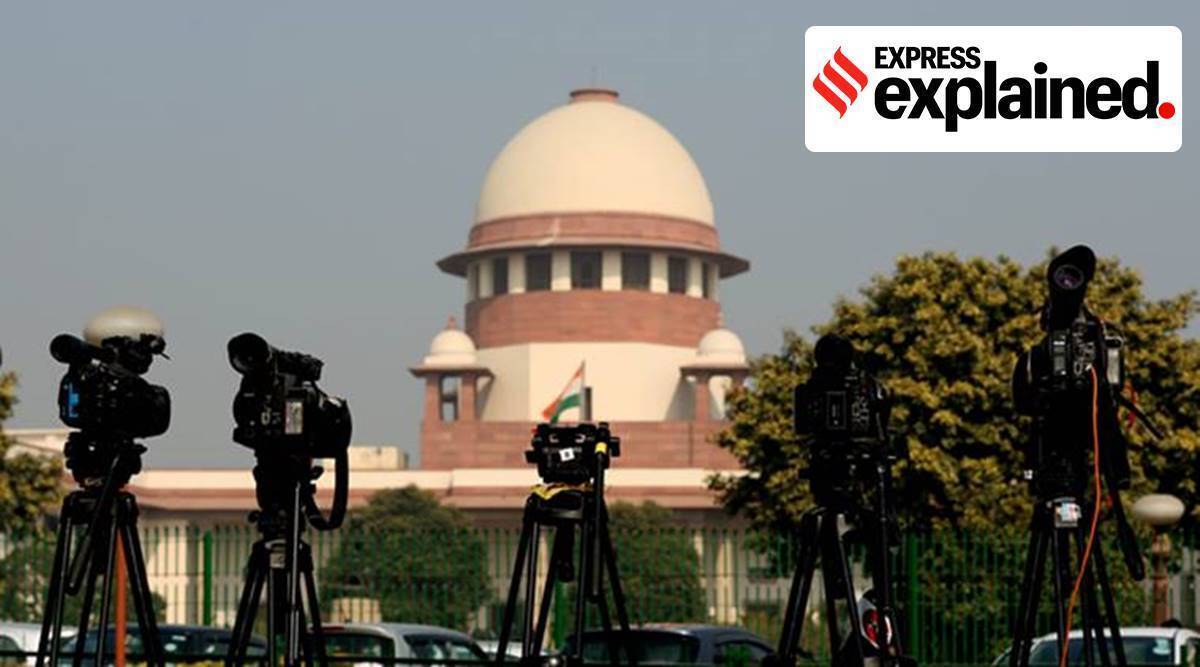Currently, most of the municipal corporations have senior bureaucrats appointed as Officers on Special Duty (OSD) under the Epidemic Disease and Disaster Management Acts, in charge of the Covid situation.
A three-judge bench of Supreme Court Wednesday passed an order directing chief executive officers of local bodies to continue running the same till elections are held. The order came on an interlocutory application moved by Gujarat government seeking permission to appoint administrators in the local bodies where terms of the political executive body are ending this month and where the State Election Commission (SEC) had deferred elections due to the pandemic.
Why were the elections to the local bodies postponed?
The terms of six municipal corporations, 55 municipalities, 31 district panchayats, and 231 taluka panchayats in Gujarat are ending this month.
But this October, the SEC, which is the authority for conducting elections of the local bodies, had declared postponement of the elections for three months, citing the Covid-19 pandemic. The state however saw bypolls to eight Assembly constituencies held in November on seats vacated because of the Congress MLAs’ resignations ahead of the Rajya Sabha elections.
Why did the Gujarat government move the Supreme Court
In the wake of the postponement of elections by SEC, the state wanted to appoint administrators for the smooth functioning of the local bodies after the terms of the elected bodies ended, till the constitution of a new elected body. However, a judgment of Gujarat High Court (HC) of 2015 prohibited the state government from doing so.
In 2015, in the backdrop of Patidar reservation agitation, through the ordinances, the Gujarat government had substituted certain provisions of the Gujarat Panchayats Act, Gujarat Municipalities Act and Gujarat Provincial Municipal Corporations Act. The amendments allowed the state government to appoint administrators in local bodies if terms of the elected wings were ending and constitution of new elected bodies by SEC was not possible in the stipulated time frame because of various unforeseen circumstances. The parent act had cited such circumstances as natural calamity, riots, communal disturbances. However, in the ordinances, one more circumstance was added which was ‘an apprehension that voters will not be allowed to vote frankly and freely.’
Soon after promulgation of the ordinances, the SEC had postponed the elections to the six municipal corporations, more than 50 municipalities, over 31 district panchayats and over 20 taluka panchayats while citing the newly added circumstance.
However, the postponement of elections and the ordinances were challenged in HC. And a division bench of Justices Jayant Patel and N V Anjaria struck down the ordinances while terming them as “unconstitutional”. The HC judgment ordered that the new bodies have to be constituted as per the constitutional mandate. It also observed that the constitution mandates the Election Commission to hold elections and to create a situation for new office-bearers to take over. The HC did not grant any stay as sought by the state government and the SEC. It also directed the SEC to conduct elections.
Eventually, the SEC conducted the elections as per the HC order. Facing a lot of protest from its core support group during Patidar reservation agitation, the ruling BJP lost majority of the panchayat bodies in the state then. However, it retained its hold on the urban and semi-urban local bodies.
Meanwhile, the SEC had challenged the judgment in the SC by filing a Special Leave Petition (SLP), but a decision on it remained pending. ? Follow Express Explained on Telegram
This year, the SEC declared to postpone the elections owing to the pandemic. However, with the 2015 HC judgment still before the SC, the state could not go ahead and appoint administrators. In a constitutional dilemma, the government moved the interlocutory application in the SLP moved by the SEC before the SC while seeking permission to appoint administrators to the local bodies. But, the three-judge bench of the apex court ordered appointment of Chief Executive Officers of the respective local bodies to carry on necessary functions without taking any policy decision and till the new members can take charge. The apex court did not agree to a request by Solicitor General Tushar Mehta, who was appearing for the State of Gujarat, to substitute CEOs of the local bodies with other nominated officers to carry out their routine functions till the time new bodies are in place.
What next?
Following the SC order, the state directed the chief executive officers of the local bodies concerned to carry on daily functions but without taking policy decisions.
Chief Minister Vijay Rupani immediately put out a statement directing chief officers of 51 municipalities and municipal commissioners in six municipal corporations to run them till the elections were held. The SEC has told the SC that it would hold the elections by February 2021, and that processes toward it had begun.
Meanwhile, the SC order has disposed of the application moved by the Gujarat government in the SLP moved by the SEC. However, the SLP is still pending.
Currently, most of the municipal corporations have senior bureaucrats appointed as Officers on Special Duty (OSD) under the Epidemic Disease and Disaster Management Acts, in charge of the Covid situation.
Source: Read Full Article


